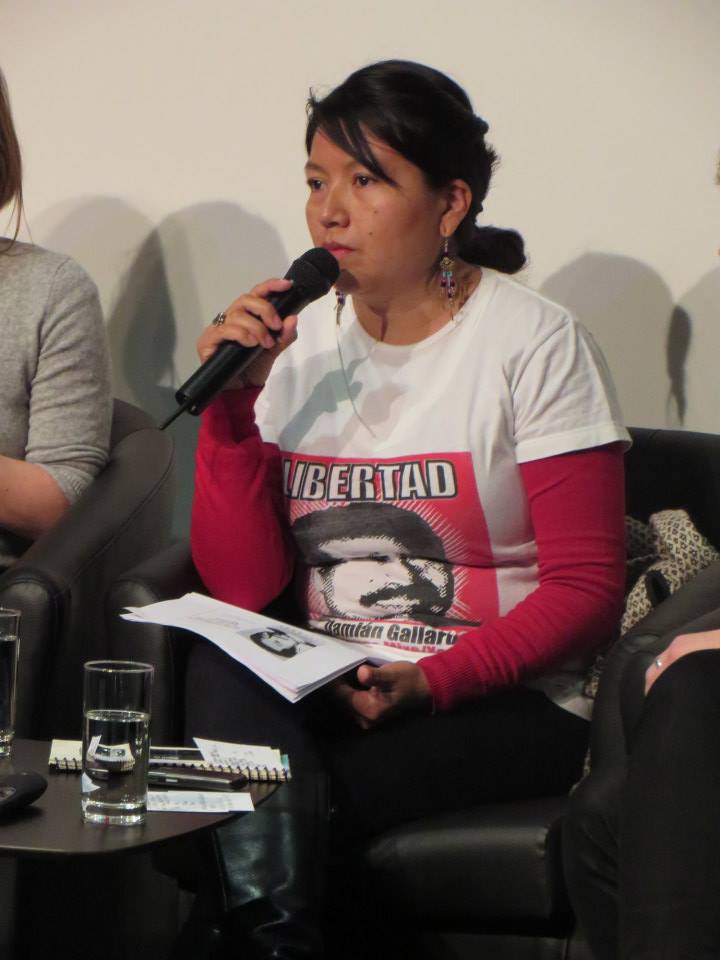
Idolina Gallardo: Indigenous Mexican human rights defender
When Idolina's brother formed part of the teachers' union protest, he was disappeared and later jailed forcing Idolina to take up his defence. Here, she explains to ISHR the impact of the represion of human rights activism in Mexico.
Idolina is a teacher in Tlahuitoltepec (Oaxaca, Mexico) who participates in a model of distance learning through televised classes called ‘telesecundaria’. She was completing a doctorate degree in education when her brother was detained in relation to his participation in a protest led by the ‘Seccion 22’, the democratic branch of the Mexican teacher’s Union, against a reform which would have negative consequences on the educational system in the indigenous and rural communities. She then decided to leave aside the doctorate in order to fully dedicate herself to the defence of her bother. This has been a breathless process since its beginning.
‘The educational reform that the Mexican State wants to introduce would lead to privatisation and unification of the learning methods and assessments.’
The reform was denounced not only in Oaxaca but also in other Mexican states, as leaving aside indigenous communities with its top-down approach. For example, the current system includes what are called ‘normal schools’ (escuelas normales), where local teachers are trained specifically to obtain placements in local, rural schools. Says Idolina, the reform plans to set a standardised assessment, developed by government officials or businesses, for all the professors of the country. This new evaluation would not take into account the diversity of backgrounds, cultures and needs of the children, and would end up ‘cleaning’ schools of these indigenous professors and curtailing their labour rights. Whilst many teachers do agree that there should be some kind of evaluation, they believe it should be defined through a bottom-up approach by experts and affected stakeholders.
‘The conditions of the detention of my brother were brutal.’
On 18 May 2013, an unidentified armed group broke into the family house and disappeared Idolina’s brother. Damian Gallardo then remained incommunicado for 30 hours, after which he was charged on the grounds of ‘organised crime’ and denied any kind of contact with his family or lawyer. He received physical and psychological torture, and was forced to confess without witnesses, until the National Human Rights Commission finally facilitated access for his lawyer. Damian then withdrew his declarations and denounced a case of torture, yet he and the other detained teachers were transferred to Jalisco’s maximum security prison, hundreds of miles and mountains away from their hometown. The teachers were formally accused of being kidnappers, the prosecutors basing their accusations on allegedly suspicious phone transcripts which, until recently, they declined to disclose. Idolina’s brother now remains in the maximum security prison, but ‘he feels strong’, Idolina asserts. He faced one case of aggression by prison officials, but fortunately it did not occur again. Yet he struggles to communicate with the outside world, and the hearings he should attend for the legal recourse he lodged against the kidnapping sentence continue to be postponed indefinitely.
‘I am not only defending my brother’s cause, I am defending the cause of all those protesters who suffer from arbitrary detention, criminalisation and defamation campaigns.’
‘I come here in representation and support of all of them’, she adds, speaking about her trip to Europe. She explains that this phenomenon is nothing new, and that the State is trying to send the message that human rights defenders and those who disagree with State reforms and policies should better stay quiet. ‘Yes, State repression has a chilling effect on protesters and defenders, even on citizens who simply sympathise with the Unions. But the increasing publicity of this repression raises awareness and multiplies the discontentment, and will eventually have the reverse effect of leveraging opposing voices’.
‘Yes I am afraid, but I am also full of hope.’
She knows that the way is long and full of obstacles, starting with the founded fear of reprisals when she comes back to Mexico after her defense work in Europe and the constant control that she is subjected to back home. ‘We see strange cars parked near our house, people asking questions to my relatives… We have even been accused of having illicit incomes, even though we are a very modest indigenous family with no properties at all’ she explains. Idolina knows that her trip to Europe is being defamed through the press back home, but she also knows that she counts on the support of local NGOs and, she hopes, the international mechanisms which she has travelled to Geneva to meet with in case she faces threats when she returns to her home country.
